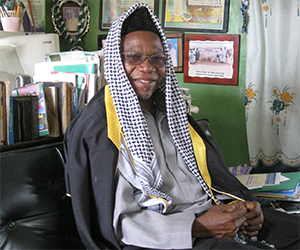Pregnancy can be dangerous. No one understands that better than Sheikh Salahudeen Busairi of Ibadan, Nigeria.
“I told my wife to stop producing. That after this pregnancy, no more,” explains Sheikh Busairi, an Islamic scholar and local Imam, when discussing his wife’s difficult pregnancy which almost led to her death. “I was afraid of losing her. And thank God she survived that last pregnancy, and ever since then.”
Nigeria has one of the highest levels of maternal mortality in the world, losing more than 500 women with every 100,000 live births. In an effort to address this alarming statistic, the Nigerian Urban Reproductive Health Initiative (NURHI), a five-year Bill and Melinda Gates Foundation-funded project, was launched in 2009. Led by the Johns Hopkins Bloomberg School of Public Health Center for Communication Programs (JHU•CCP), NURHI aims to eliminate the supply and demand barriers to the use of family planning in selected urban areas of Nigeria.
Sheikh Busairi, an Imam in one of the six NURHI focus cities, has become a vocal proponent of family planning. He leads one of NURHI’s Advocacy Core Groups, which focuses on influencing local religious leaders to become champions of increased contraceptive use and family planning to their congregants.
Sheikh Busairi believes that Nigerian men and religious leaders must be the focus of efforts aimed at increasing family planning. “We need to address the minds of men to subscribe to it [contraceptives], that it is to their own advantage. Because the more children you have to feed, the more you are burdened unnecessarily,” he asserts.
In a country challenged by high levels of poverty and unemployment, this message is especially relevant in the urban centers, the areas that are being addressed by NURHI.
Despite efforts to promote family planning in Nigeria, religion continues to be a major barrier, but Sheikh Busairi is quick to respond to men who claim that Islam prohibits contraceptive use.
“Family planning is not meant to destroy your reproductive system. It is meant to create a method for you to have a good life, to live a good life that will make you able to worship your God in a conducive manner that will make you rest assured that the hereafter is better for you,” he argues.
And, with a smile, Sheikh Busairi continues, “Because if you don’t live well, you cannot worship well.”
Open dialogue with women AND men about family planning. Debunk the myth that Islam disapproves of contraceptive use. Sheikh Busairi and NURHI hope that these efforts will finally address the women’s health crisis that currently exists in Nigeria.
Learn more about NURHI.





